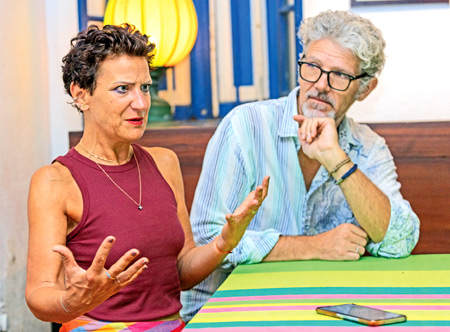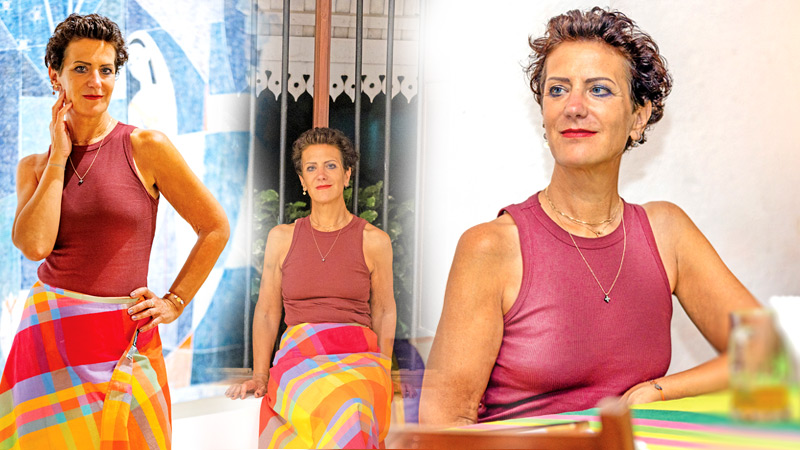Recently, I had the rare opportunity to experience a vibrant musical performance titled ‘Orlando Trip,’ presented by Austrian artist Anna Luca Poloni and her collaborator Christian Mair at the Barefoot Gallery Garden.
The event celebrated Austrian National Day and showcased their joint project, ‘Fox On Ice’, which delves into narratives of transformation through feminine and fluid perspectives. At the inter-creative crossroads of music, literature, film, and theatre, this dynamic duo passionately explores the complexities of identity and change.

Anna Luca Poloni and Christian Mair
As they take audiences on a journey filled with whims and introspection, Poloni and Mair challenge us to embrace fluidity in our understanding of self and the world. Through their engaging performance and innovative storytelling, they ignite conversations about the human experience, paving the way for deeper connections in a rapidly changing society. I also had the opportunity to interview Anna Poloni, delving deep into her artistic process and gaining insights into her creative journey. In this feature, we explore Anna’s thoughts and inspirations behind ‘Orlando Trip,’ capturing the essence of her artistic vision and the unique experience of the performance.
Anna Poloni explains the inspiration behind her project, ‘Orlando Trip,’ which centers on the theme of change and transformation. She believes that peace is a practical solution to the issues facing the world today, where the idea of change can often be met with resistance, especially in affluent societies. As she puts it, “Peace is an option that requires us to embrace change, not fear it.”
Poloni emphasises that storytelling is vital for illustrating the impacts of successful change, as it resonates more with audiences than just lecturing them. “People learn through narratives, and that’s where the power of transformation lies,” she notes.
In developing the show, Poloni and her team looked for a key narrative that reflects both historical and modern transformations. They found this in Virginia Woolf’s novel ‘Orlando,’ which explores a character who embraces various changes beyond just gender identity, as noted by Tilda Swinton.
Poloni also highlights her connection to Lodovico Ariosto, an Italian poet from the Renaissance. She recalls learning about both Ariosto and Dante during her education in Sicily.
Woolf’s work draws inspiration from Ariosto’s rich poetry, which features themes of heroism and gender fluidity, including female knights. By reinterpreting these classic narratives, Woolf showcases the idea of female empowerment, making it relevant today. Through ‘Orlando Trip,’ Poloni aims to celebrate the beauty of change and its significance throughout history.
Living in the character
Orlando is a mythical character known for transformation and fluidity. In her performance, Anna Poloni doesn’t just play Orlando; she becomes the character in a way that feels deeply authentic. It’s more than acting, it’s a personal connection. She relates to Orlando’s journey through themes of identity and gender fluidity, blending both male and female traits, much like a master artist mixing colors on a canvas.
Speaking about the character Orlando and her performance, Anna reflects on the deeper connection she feels to the character’s journey. She expresses that, “Human beings contain both male and female aspects,” a wisdom that has been acknowledged for centuries.
Anna notes that society today struggles with the concept of gender fluidity, which can lead to anxiety and discomfort. She recalls the thoughts of Viennese psychoanalyst Sigmund Freud, saying, “We are not the owners of our own house,” suggesting that everyone has both male and female traits within them, whether they acknowledge it or not.
This exploration of identity resonates with Anna on a personal level. She emphasizes the importance of freedom in self-expression, stating, “It is crucial to allow yourself to be both and to choose who you want to be.”
Growing up in Sicily, she observed how people along the coast often shouted into the sea, longing for connection, which she found reflected in the depth of her own voice.
She shares that despite her Austrian heritage, her deep voice has always stood out, recalling her childhood experiences with half-brothers who also had lower voices. “It felt unusual when I returned to Austria, as my voice was quite deep, similar to a boy’s,” she explains.
As an artist, Anna finds joy in the variety of her vocal abilities, often singing songs by artists like David Bowie. She appreciates blending different vocal styles, saying, “Singing allows me to bring together both parts of my personality.” In her performances, she seamlessly transitions between deep and higher notes, demonstrating her belief that “if I can climb the ladder out of my physicality, then why shouldn’t I?” Ultimately, she believes this duality is a core aspect of her personal identity.
Fluidity as an identity
The theme of fluidity and transformation in “Orlando Trip” suggests that fluid identity can be seen as a new survival strategy, often promoted by the consumerist market economy. When asked about this overwhelming theme that impacts the world, Anna offers an engaging perspective. She believes that Virginia Woolf’s work captures a deep and playful approach to identity. “It’s not just elegant; it’s rooted and profound,” she says, highlighting how these themes resonate in today’s society.
Anna reflects on the obsession with identity politics, especially in Europe and parts of America. She said, “We’re all 96% the same,” emphasising the need to look beyond pure identities. While she supports the fight for female rights and equality, like equal pay and justice, she also advocates for a broader view of fluidity.
Anna introduces the concept of radical universalism, inspired by Israeli writer Omri Boehm. “He’s a peacemaker for Palestine, and despite being Israeli, that makes waves in conservative circles,” she adds. Anna appreciates Boehm’s idea that, while we should respect individual identities, we must also recognize shared challenges, such as the climate crisis.
Woolf, she argues, foresaw the importance of fluidity long before these modern issues arose. “She was a feminist with a playful twist,” Anna said. She cites Woolf’s words in “Life and the Lover”: “You think you know me, but when I wear a skirt, I might just surprise you!”
In essence, Anna suggests that embracing fluidity makes us more interesting and peaceful. “Focusing solely on identity politics won’t lead to a better understanding. Let’s float between words and worlds, it’s much more fun!”
Inter-creativity expression
In Orlando Trip, Anna delivers a visual storytelling experience that packs a punch, adding flair to her performance and lyrics. This dynamic storytelling isn’t just an added bonus, it’s a vibrant character all its own, powerfully reflecting her emotional journey. In today’s postmodern landscape, for many contemporary artists a single medium just doesn’t cut it anymore. So, why should Anna limit herself to being just a performer, singer, or poet? She boldly embraces the chaos of creativity by weaving visual elements into her artwork, proving that in the world of art, more is definitely merrier.
When asked about the powerful visual storytelling in her show, Anna shares her insights on why she incorporates multiple artistic elements into her work. She says, “I’m a big believer in what’s called inter-creativity,” a concept that emphasizes blending different artistic disciplines rather than sticking to just one.
Anna explains that inter-creativity first gained prominence in Vienna during a notable period of artistic collaboration. “It was a time when various art forms mingled together, creating a rich tapestry of creativity,” she notes, referencing its evolution across cities like Paris and Berlin.
She and her friends have revived this idea, aiming to craft a multi-dimensional experience. “We want to create a show that’s not just about having a big budget, but rather about offering a truly immersive experience,” Anna said. She connects this approach to her Viennese roots, blending the logic of dreams with her performances, drawing inspiration from the great poets of Austria.
Collaboration is key for Anna. “Christian and I have worked together for over 20 years. This is the first time I’ve really integrated visuals into our project,” she explains. The visual elements, created by Christian, complement her performance beautifully. “It enhances the whole experience and truly reflects my artistic vision,” Anna adds.
Overall, she believes that embracing inter-creativity aligns perfectly with our current lives, making art more engaging and relevant. “This approach feels very much in tune with the times we are living in,” she said, highlighting her commitment to evolving as an artist.
Performance in Sri Lanka
When discussing her performance in Sri Lanka, Anna Poloni shares her unique experience. “It wasn’t a typical public concert, the atmosphere was special,” she said, mentioning the presence of many Europeans in the audience.
Anna felt that the Sri Lankan audience was particularly engaged. “They were so concentrated, truly absorbing everything,” she added.
She contrasts this with her experiences in other countries, noting that while audiences in Tunisia can be shy, those in Turkey are more accustomed to such performances. In Sri Lanka, she found a strong curiosity and depth in discussions afterward. “The conversations were very profound,” she said.
Excited about future opportunities, Anna expresses a desire to perform again in a public setting or festival. “I’d love to engage even more with the local audience,” she concludes, grateful for the chance to connect with such an interested crowd.
Concluding the insightful interview, Anna shared her upcoming plans. “First, we’re returning to Vienna to sort out details after touring,” she said, mentioning an exciting performance in Romania at the end of November and the promotion of their newly released studio album.
“After Romania, we’ll focus on Spain and France, and we even have an invitation to Vietnam,” she added, expressing a desire to perform in Asia to gauge audience reactions.
Anna highlights the universal appeal of the Orlando story, especially the character’s love for the Asian queen of Katai. “It’s fascinating how Ariosto imagined a dreamlike image of China without ever visiting,” she explains.
She also plans to incorporate visuals from their travels into the show. “We want the visuals to evolve, capturing the essence of each place,” she said.
Images:
Sulochana Gamage
Location: Barefoot Gallery







